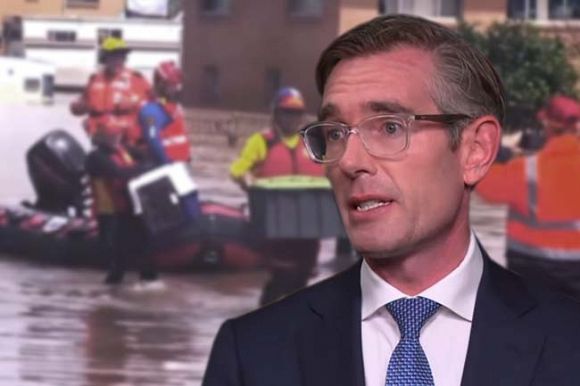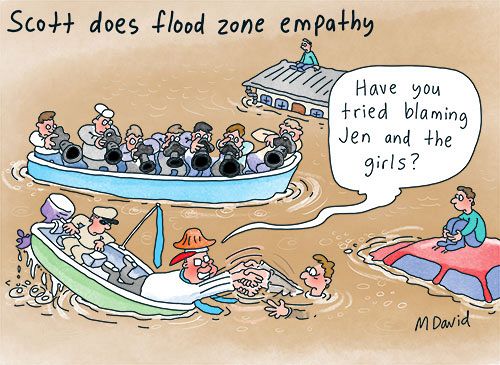In the wake of some of Australia's worst floods, many are questioning the swiftness and efficacy of the Federal Government's efforts to mitigate the impact on beleaguered communities.
In late February, communities in Northern New South Wales (NSW) and South-East Queensland were hit by torrential levels of flooding. These regions received more than a year of rain in just over a week, which has been dubbed by NSW Premier Dominic Perrottet and NSW Minister for Emergency Services Steph Cooke as “unprecedented”.
Justine Elliot, Labor MP for Richmond – an electorate which was one of the most flood-affected in Australia – told IA:
It has been the most devastating flood we’ve ever had… we had a major flood in 2017 [but] this was much worse and the impact has been really horrific across the region.
It’s a humanitarian crisis. We have many people without anywhere to live; with no food and no money.
The natural disaster has inflicted untold damage across North-Eastern Australia. Twenty-two people have lost their lives in the floods, while more than 15,000 Queensland homes were affected and hundreds of thousands were subject to evacuation orders in NSW.
During this harrowing period in Australia’s history, the Queensland State Government’s response has been generally well-received, as the NSW Government has been the subject of scrutiny for its handling of the mass floods.
Meanwhile, the Federal Government – armed with an array of emergency management powers and tools – was widely slammed for providing what some described as a sluggish and inadequate flood response. The contingent of critics included NSW Upper House Liberal MP Catherine Cusack – who accordingly intends to resign from the Parliament – and NSW Nationals MP Geoff Provest.
'We weren't slow': Scott Morrison defends flood response
The Federal Government has been accused of delivering a delayed and, ultimately, unsatisfactory response to one of Australia’s most severe natural disasters in recent memory.
Before a national emergency was declared in NSW on 8 March – a power assigned only to the Federal Government in the National Emergency Declaration Act 2020 (Cth) – the Deputy Opposition Leader Richard Marles and Shadow Minister for Disaster and Emergency Management Murray Watt were already calling for Commonwealth intervention.
Prime Minister Scott Morrison was unfazed by such criticism, asserting that “we weren’t slow”. He told reporters that calling on the Australian Defence Force (ADF) and its resources cannot be done “at a moment’s notice”.
He also claimed that “you can’t just turn [the mobilisation of the ADF and its resources] off and on”.
Ms Elliot viewed the Federal Government’s response differently.
She told IA:
“From day one I was calling for the army to come to assist with the rescues and the recovery. That took well over a week before we started seeing that… that was really debilitating when we needed that support on the ground.”
Ms Elliot was also scathing of the Government’s approach to facilitating communications in flood-affected areas:
We had a massive communications failure. Over 60,000 people were unable to access the NBN and thousands didn’t have access to mobiles and thousands to access to 000 calls because of the massive damage to infrastructure.
There was nothing from the Federal Government in terms of an emergency communications plan. That really risked lives because you are talking about people who couldn’t be rescued, they were isolated.
Ms Elliot laid blame with NSW Coalition Government as well, saying:
They had no emergency disaster plan in place… You don’t have the capacity to get people on the ground and get more resources here… We had a situation where helicopters were sitting in Sydney that could’ve been brought up if the [NSW Government] had a plan.
I understand the Queensland Government has emergency disaster plans in place so it’s a bit of a contrast.
Ms Elliot believed that both the Federal and NSW governments’ responses displayed “a failure to plan, a failure to act, and a real failure to deliver the support and funding we need".
Emergency Response Fund left largely unused
Critiques of the Government also related to funding and resources that it did not utilise. It is believed that, since its inception in 2019, only $50 million of the $4.8 billion in the Emergency Response Fund (ERF) has been put to use. These funds are earmarked for increasing disaster resilience, and responding to and preventing natural disasters.
Minister for Emergency Management and National Recovery and Resilience Bridget McKenzie suggested that the ERF was operating as planned.
She said:
“The emergency response fund was set up as a future fund to be used when all other sources of funding have been exhausted.”
The Government’s National Recovery and Resilience Agency’s website reads:
“The ERF was set up with $3.9 billion and has since earned an additional $751 million in interest. This means Australia has a growing pool of money available for natural disaster recovery and preparedness for the future.”
The Opposition questioned the underlying rationale behind the ERF, with Ms Elliot telling IA:
“We’ve been saying for a long time this $4.8 billion emergency fund should be used for the purposes of mitigation and the prevention of floods. We’ve been saying that for months and the Government hasn’t used it… It’s been a massive issue.”
Communities step up as Federal Government falters
The limitations of the Federal Government’s capacity, or willingness, to respond to the mass flooding crisis was illustrated in its early stages, with Minister of Defence and Member for Dickson, Peter Dutton, organising a GoFundMe fundraiser for affected persons in his electorate.
To date, the page has gathered over $28,000, which is set to be handed to the Dickson Seniors Council.
Ms Elliot – whose electorate includes the areas of Ballina, Tweed Heads, Byron Bay and Murwillumbah – said the absence of a comprehensive response by the Federal Government was a common grievance held by residents.
She told IA:
“That’s what I hear wherever I go: ‘where’s the Government? Why has it fallen to us’?”
Further, she explained that ordinary people took proactive steps to help each other and survive during this natural disaster:
“In the absence of government support, the community stepped up… A lot of community members installed satellites and hooked up to providers like Starlink [to ensure access to communications]. The community had to pick this up."
Ms Elliot was reported that many in the community were left with no choice but to facilitate and participate in the rescue of neighbours, friends and strangers:
“Even through my Facebook page we were helping to coordinate rescues. It’s an absurd situation. It should be [conducted via] a designated system.”
While in Lismore, the Prime Minister sought to explain the perceived failures of his Government, saying that “every resource can be applied... There can never be enough support in a natural disaster such as this".
Additional flood disaster payments given following backlash
In February, the Federal Government committed to providing lump-sum payments to people in NSW and Queensland ‘seriously affected’ by the floods. Adults were entitled to $1,000 and each child in a household would receive $400. These payments were made across South-East Queensland and Northern NSW.
The Australian Government disaster recovery payments were extended for two weeks. Yet many people in areas like Ballina and Tweed Heads were initially ineligible for further financial assistance. At the same time, communities represented by Nationals MP Kevin Hogan in the neighbouring electorate of Page were granted such payments.
The decision was met with outrage across Australia, with accusations of political bias made against the Government.
Ms Cusack – who resigned from the NSW Parliament as a result of the selective flood relief funding – said it was “probably the most unethical approach I have ever seen”.
Ms Elliot is of the view that “for many people that was the breaking point. They’ve lost their homes, cars, livelihoods, everything. To be treated so unfairly was disgusting. That’s why so many people spoke out".
She was not concerned with the Government’s motives behind the decision:
“It may very well have been a political game [Scott Morrison] was playing… so whether it’s that or just sheer incompetence or a combination of both… I don’t care because we didn’t get it [at the time].”
Climate change impacts already manifest
For many, these floods have once again highlighted the catastrophic impact climate change is already having on Australia and the globe. This natural disaster hit Australia two years after raging bushfires devastated peoples’ homes, animals, habitat and the environment.
Ms Elliot acknowledged the climate impacts, but stated that her main priority was persons in need of immediate assistance:
“Our focus has been on people that are homeless and stranded, but of course this is a time to be having a discussion about this Government’s lack of action on climate change. We’ve just seen nine years of inaction.”
Cam Walker, Campaigns Coordinator at Friends of the Earth Australia, said:
“Of course, Australia has always experienced droughts, floods and other natural disasters. What we are experiencing in the 21st Century is an intensification of these disasters.”
Mr Walker believes the Federal Government should be doing more to prevent further floods and bush fires in Australia through its climate policies.
He told IA:
The Federal Government has long ignored and downplayed the science, and has comprehensively failed the Australian people on climate change. Being a wealthy country with a high per capita carbon footprint and vast supplies of renewable energy, we should be a global leader when it comes to acting to reduce greenhouse emissions.
Without meaningful, concerted action now to rapidly carbonise, Australia faces a future that is hotter, drier, with more extreme weather events like flooding and heatwaves and longer and more intense fire seasons.
Besieged but not broken: The task of rebuilding communities
As the worst of the flooding appears over, affected communities are conscious that there is a long way to go before life can return to normal.
Queensland Treasurer Cameron Dick has estimated that the State’s recovery could cost up to $2.5 billion. NSW Treasurer Matt Kean is yet to release details on the possible clean-up bill for the State.
To ensure that such mistakes are not repeated amidst future natural disasters, Ms Elliot believes NSW must “have a full, independent inquiry. That inquiry must be fully transparent and examine some of those failures to plan".
On 21 March, NSW Acting Premier Paul Toole announced that an inquiry chaired by Professor Mary O’Kane and former NSW Police Commission Michael Fuller would review the Government’s response to the floods. The terms of reference for the inquiry have been released.
For Ms Elliot, the Federal Government must also mandate the ADF to “assist with the removal of debris and the rebuild” and provide “a massive injection of funds” for emergency and long-term housing.
Despite the hardship residents in her electorate have endured, Ms Elliot believes:
“We’ve got an incredible community here that has really stepped up to help one another and they’ll continue doing that throughout the recovery.”
IA contacted Minister Bridget McKenzie’s office and Kevin Hogan MP’s office for comment. Both did not reply prior to publication.
Nicholas Bugeja is a Bachelor of Laws (Honours) and Arts graduate from Monash University and an Assistant Editor for Independent Australia.
Related Articles
- Morrison, Frydenberg, Joyce and Cash fundraise for Labor electorates
- Twelve more things revealing Australia’s poor economic management
- Coalition faces the final curtain
- CARTOONS: 'Dirty deeds done dirt cheap...'
- Coalition gaffes galore to the tune of an off-key ukulele
 This work is licensed under a Creative Commons Attribution-NonCommercial-NoDerivs 3.0 Australia License
This work is licensed under a Creative Commons Attribution-NonCommercial-NoDerivs 3.0 Australia License
Support independent journalism Subscribe to IA.















